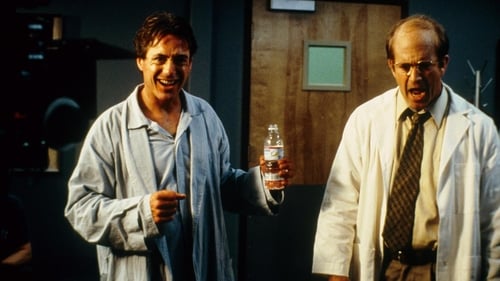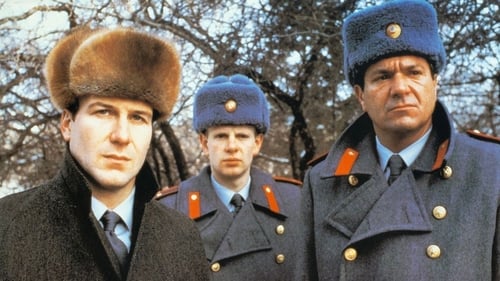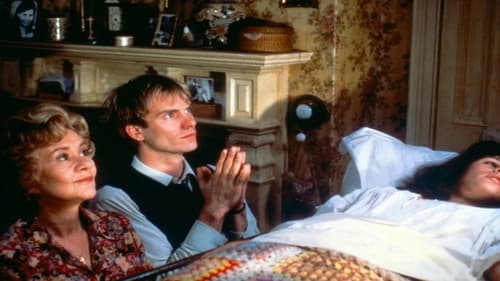
Dennis Potter
História
Dennis Christopher George Potter (17 May 1935 – 7 June 1994) was an English television dramatist, screenwriter and journalist. He is best known for his BBC TV serials Pennies from Heaven (1978), The Singing Detective (1986), and the television plays Blue Remembered Hills (1979) and Brimstone and Treacle (1976). His television dramas mixed fantasy and reality, the personal and the social, and often used themes and images from popular culture. Potter is widely regarded as one of the most influential and innovative dramatists to have worked in British television.
Born in Gloucestershire and graduating from Oxford University, Potter initially worked in journalism. After standing for parliament as a Labour candidate at the 1964 general election, his health was affected by the onset of psoriatic arthropathy which necessitated Potter changing careers and led to him becoming a television dramatist. His new career began with contributions to the BBC's Wednesday Play anthology series in 1965, and he continued to work in the medium for the rest of his life. He also wrote screenplay adaptations for the Hollywood studios. He died of pancreatic cancer in 1994.

Screenplay
Enquanto está hospitalizado com um caso grave de psoríase, o romancista Dan Dark (Robert Downey Jr.) revive a história seu primeiro livro. Febril, paranóico e interessado no surto dos musicais, ele se confunde com seu protagonista, um detetive que investiga o assassinato de uma prostituta de Los Angeles nos anos 1950.

Writer
American producer James Boyce and his airhead wife Amber rent an English country mansion where the British horror flick "Smoke Rings" was filmed twenty years previous. Amber's mother was model-actress Mandy Mason, who died mysteriously after her appearance in "Smoke Rings." The property rental to Boyce was arranged by middle-aged lawyer Henry Harris, who continues to live with his lovesick memories of the late actress. Boyce invites Harris to dinner, and "Smoke Rings" airs on TV that same evening. During the following days, Harris observes Amber's behaviour paralleling events experienced both by her mother and in the movie.

Himself
Dennis Potter a television dramatist talks about his work, politics and his fears for both.

Writer
A version of Dennis Potter's play for television, remade shortly before his death as the original 1960s version had been wiped.

Writer
Para alguns ele era um mago, um milagreiro; para outros era um charlatão, uma fraude. Suas teorias eram revolucionárias, mas ele foi rejeitado por seus contemporâneos e deportado de sua terra natal, Viena. Ele incendiou Paris, se tornou um renegado na medicina, um visionário, um vilão.
Franz Anton Mesmer Nasceu em 23 de maio de 1734, em Iznang, aldeia próxima do lago de Constança, filho do casal Franciscus Antonius Mesmer e Maria Ursula Michel, membros de uma grande família católica da Suábia, região que hoje pertence à Alemanha. Mesmer desencarnou em 5 de março de 1815.

Himself
Dennis Potter, Esther Dyson, William Gibson and other techno-thinkers appeared in this award-winning three-part documentary series which examined social changes brought about by new information technologies, along with other issues and dilemmas facing society in the 21st Century.

Screenplay
During a train ride, an anxiety attack leads middle-aged illustrator John into an identity crisis. As his marital problems merge and blur into his fantasy life with prostitutes and call girls, a long-dormant secret friend of his childhood surfaces in his delusions.

Novel
During a train ride, an anxiety attack leads middle-aged illustrator John into an identity crisis. As his marital problems merge and blur into his fantasy life with prostitutes and call girls, a long-dormant secret friend of his childhood surfaces in his delusions.

Director
During a train ride, an anxiety attack leads middle-aged illustrator John into an identity crisis. As his marital problems merge and blur into his fantasy life with prostitutes and call girls, a long-dormant secret friend of his childhood surfaces in his delusions.

Writer
Years after a desperate teenage Linda gives up her baby for adoption, she finds herself face-to-face with Martin, a young man claiming to be her long-lost son. Linda embraces Martin and in him finds a welcome reprieve from her unhappy marriage to the neglectful Henry. But soon Martin grows violent and becomes obsessed with Henry -- a philandering man whose only offspring is an expansive model train set that devours his waking hours.

Writer
This was the last of Dennis Potter's "one-shot, one-slot" plays for television. It had its origins in Potter's 1983 play "Sufficient Carbohydrate," about two middle-aged executives, one English, one American, who both work for the same multinational food company. Together, they vacation with their wives on a Greek island. In the TV adaptation, British businessman Jack becomes bitter as he faces the prospect of seeing his family company taken over by an American corporation. On a holiday at an Italian villa with his new manager, Eddie, he begins to stir up antagonism prompting Eddie's son Clayton to fantasize a murderous outcome.

Executive Producer
Exploring the somewhat darker and more mysterious side of the Lewis Carroll's classic book, the movie follows Alice Liddell (the book's inspiration) as an old woman who is haunted by the characters she was once so amused by. As she thinks back on it, she starts to see her relationship with the shy author/professor in a new way and realizes the vast change between the young Alice and the old.

Writer
Exploring the somewhat darker and more mysterious side of the Lewis Carroll's classic book, the movie follows Alice Liddell (the book's inspiration) as an old woman who is haunted by the characters she was once so amused by. As she thinks back on it, she starts to see her relationship with the shy author/professor in a new way and realizes the vast change between the young Alice and the old.

Screenplay
Um investigador da polícia de Moscou precisa solucionar um triplo assassinato que aconteceu no Parque Gorky: três cadáveres congelados com rostos mutilados e dedos cortados, são descobertos quando chega a primavera e a neve acumulada começa a derreter. Ele suspeita que ninguém quer que o caso seja realmente solucionado, além de começar a perceber que existe algum tipo de conspiração que envolve a alta sociedade de Moscou e seus governantes.

Writer
Produced in 1976 for BBC's Play For Today. Banned for 11 years, and finally broadcast on August 25th, 1987. It was remade, with Denholm Elliot returning to the cast, in 1982.

Screenplay
A strange young man has a sinister effect on the family of a middle-aged writer.

Writer
During the Great Depression, a sheet music salesman seeks to escape his dreary life through popular music and a love affair with an innocent school teacher.

Writer
Past and present intertwine: An elderly couple returns to the hotel where they became close when they were young and flashbacks to the earlier visit reveal the origins of both their pleasures and problems. Somewhere between the past and the present, Dennis Potter attempted to find "the shape of a life, of two lives..."

Writer
Another of Dennis Potter's "visitation dramas": Adultery by John disturbs Janet, so she flirts with the simple, mistreated Billy during the middle of giving him a reading lesson. Unfortunately, it triggers aggressive behavior in Billy which he directs toward John.

Writer
A reclusive, elderly author is visited by a young admirer … but both men are more than they claim to be.

Writer
On an idyllic summer afternoon in the summer of 1943, a group of children play in the West Country hills, fields and forests. With no adults around, they indulge in spontaneous games and horseplay - sometimes echoing the distant war, at other times revealing their own insecurities and petty vindictiveness.

Writer
"Where Adam Stood" is "based on" the 1907 autobiography, "Father and Son", by Christian fundamentalist and naturalist Edmund Gosse, but Dennis Potter adapted only one section of the book, adding much material of his own invention. The drama was filmed on the Devon coast near Torquay, not far from where Gosse lived. With a literal belief in the Old Testament, Philip Gosse is opposed to the new theories of Charles Darwin, espoused here by biologist Brackley. Assuming "the Lord's will" determines the fate of his ailing son Edmund, Philip Gosse creates a life-threatening situation, even suggesting the illness is God's punishment because of Edmund's desire for a toy ship.

Writer
Martin Ellis (Alan Dobie) is a blocked screenwriter who invites Helen, an actress (Kika Markham), to a hotel in central London to discuss an idea for a play he is writing with her in mind. As they discuss the play, Martin discovers that a businessman and an escort named Carol are sat at a nearby table and appear to be speaking lines from the as yet unwritten piece. Martin becomes anxious at what will eventually become of the girl, already knowing that the play will not have a happy resolution

Writer
Glen, a complete stranger, appears at the door of Elizabeth Carter, a middle-aged woman, and claims to be the illegitimate son she gave away at birth.

Writer
The religious beliefs of pet shop owner Joe (Freddie Jones) are shaken by the terminal illness of his daughter Lucy (Angharad Rees). For Potter, this play "makes more than a wry nod at possibilities which can comprehend pain, or disgust, or the implacable presence of death itself."

Writer
Playwright Christopher Hudson finds his medical problem hinders his writing. He employs secretary Sandra George and dictates his new play to her, but tensions soon develop between the two. As Hudson creates, scenes from his play are dramatized and interpolated. The play being created is Dennis Potter's Angels Are So Few, seen with a totally different cast from the 1970 BBC production.

Writer
Jack Black is a disturbed actor who believes himself to be trapped in a television play, followed around by an invisible camera.

Writer
Western journalists visit Moscow to interview Adrian Harris, a former controller in British intelligence who was also a double agent for the USSR. Harris believes in both Communism and Englishness, believing himself to have betrayed his class, but not his country. The press find these beliefs incompatible, and want to find out why he became a ‘traitor’. Harris is plagued by anxieties over both his actions and his upper-class childhood, and drinks to a state of collapse

Writer
Facing retirement, elderly journalist Clarence Hubbard reflects on the pointlessness of a life wasted writing banal tabloid human interest, animal, and crime stories. Rather than go quietly to tend roses in a garden, Hubbard begins a series of violent actions not unlike those described in tabloids, and this is heightened by inter cutting tabloid headlines between scenes. Throughout, there are occasional shots of a television critic who watches this very play as it unfolds, and he writes a negative review filled with cleverly phrased but bitter invective.

Writer
This neat, intense drama, labelled “a fable for television”, stars Tom Bell as the scruffy, childlike Michael Biddle, who is invited in from the cold of a suburban street by sexually frustrated, bored housewife Cynthia, played by Christine Hargreaves. He declares that he’s an angel, and Cynthia needs an angel, but in a way Michael fears...

Writer
Dennis Potter used his own background as a Russian language clerk in the War Office when writing this play for ITV's SATURDAY NIGHT THEATRE series. At the time of the 1956 Suez Crisis and the Russian invasion of Hungary, Private Bob Hawk reports to the London Intelligence Office where the strength of Soviet troops is under scrutiny.

Writer
Dennis Potter's controversial reading of the life of Christ, with Jesus portrayed as a hearty, fiery, well-meaning carpenter who believes that people should try to love their enemies rather than fight all the time, but who is racked by self doubt as to whether or not he is the popularly anticipated Messiah.

Writer
Writing for ITV's SATURDAY NIGHT THEATRE series, Dennis Potter introduced the notion that popular music expresses the yearning of the human spirit for a better world. A troubled young man, David Peters (Ian Holm), claims, "Once dreams were possible, that's what the popular songs told us." Rejecting rock music of the day, Peters is immersed in the tunes of Thirties crooner Al Bowlly (killed during the London blitz). He collects Bowlly memorabilia, publishes the Bowlly fan-club newsletter, and finds pleasure in lip-synching Bowlly records but his obsession with Bowlly masks certain darker events in his past.

Writer
A young local girl is murdered by a mentally disturbed youth, but the villagers blame a stranger, an Italian traveling showman and his bear, rather than see the rot in their own camp.

Writer
A no-nonsense businessman, Mr. Wilkie, is interviewed for a position with a top-of-the-line hotel chain corporation. During the interview, Wilkie attempts to complete a shaggy-dog story. His frustrations lead to a total breakdown. He suddenly snaps and pulls a gun on the interviewers.

Writer
Poor Willy’s mind has been warped by too many Westerns. He sees gunfighters on every corner, even though he’s in 1960s Swansea. Some think Billy’s simple. His Auntie just thinks he’s creative. But he’s on a dark path as his vivid imaginings grow wilder, and the world in his head comes roaring out into reality.An early piece from TV playwright Dennis Potter. (homemcr.otg)

Writer
Drama set in a men's hospital ward, written by Dennis Potter. Characters include a cunning bronchitic Londoner, a strapped-up Pole and a dying man who just wants a cup of tea.

Writer
Candidate Nigel Barton goes from idealism to cynicism as he becomes disillusioned and suspicious of hollow campaign promises.

Writer
Semi-autobiographical TV play by Dennis Potter, from the BBC's 'Wednesday Play' series. It deals with the experiences of Nigel Barton, a young man from a poor mining community who wins a scholarship to Oxford University. The villagers accuse him of snobbery, while the rich University students treat him like a peasant. Uncertain of which sphere he should be moving in, Nigel tries to reconcile himself with his proud but stubborn father, and also succeed at University, despite its pretentions which apall him.

Screenplay
In this look at Charles Lutwidge Dodgson (1832-1898), aka Lewis Carroll, Dennis Potter mixed biographical drama with a psychological profile to explore the roots of Dodgson's creativity. Dodgson tells stories to ten-year-old Alice Liddell, leading to recreations of scenes adapted from ALICE'S ADVENTURES IN WONDERLAND (1865), designed to resemble the original Sir John Tenniel illustrations.

Director
After a brief tutelage with innovative BBC documentary producer Denis Mitchell, Dennis Potter teamed with producer Anthony de Lotbiniere to film a documentary (later described by David Niven as "absolutely wonderful"). Returning to the Berry Hill roots of his childhood, Potter used interviews with locals (including his parents) to show changes in the working-class traditions of the Forest of Dean, where "the green forest has a deep black heart beneath its sudden hills, pushing up slag heaps and gray little villages clustering around the coal."












